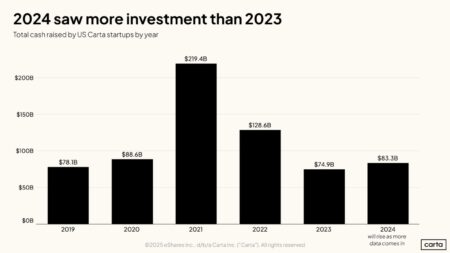Abdur Rehman | COO of Rankviz Private Limited | Building AI Agent for the Logistics industry.
As businesses today fight tooth and nail to stay relevant, the search for an edge seems to be the holy grail. One potential answer is vertical AI agents: artificially intelligent tools specially developed to tackle specific problems that an industry might be facing. The idea of vertical AI agents is becoming an increasingly disruptive force across industries as we enter an era where AI usage is starting to dominate.
During the Riyadh Logistics Conference, I spoke with a representative from a government agency who predicted that the work of operators could be reduced significantly with the use of specialized AI agents. Based on my own work with AI agents in the field of logistics, I firmly believe that AI at the industry vertical level can transform productivity and inspire ever-increasing innovation among businesses across industries.
The AI Reality For Business Leaders
From my observations, most companies in this day and age experience challenges centered around data deluge, with rapid technological innovation and pressure to continuously invent new products. Executives increasingly find themselves unable to cope with the bombardment of information and the need to change all the time, not to mention issues like talent gaps, complex integration requirements, and uncertainty about ROI and about how to implement AI effectively.
The Power Of Specialization
Vertical AI agents can help businesses overcome these challenges by performing targeted services designed to solve specific industry problems and by helping leaders make accurate choices more easily. A vertical AI agent can be defined as an agentic AI program that possesses information on a deep level within the market in which it operates. It uses a pretrained dataset consisting of its desirable sector’s information, allowing it to have a greater breadth of knowledge about that specific sector and to perform relevant tasks efficiently.
Let’s take a look at a few examples of applications for vertical AI agents across industries:
• Economic Empowerment
Organizations can use vertical AI agents to automate operational workflows, saving time and money. In manufacturing, AI-enabled predictive maintenance can reduce downtime and maximize equipment lifetime.
• Industry Solutions
Vertical AI agents are designed to perform specific tasks relevant to their industry. In finance, an AI agent can be trained to detect fraudulent transactions, mitigate risk and protect assets. In legal, AI agents can assist with document review and due diligence, which could significantly reduce the time and resources required for these tasks.
• Human Resources
AI agents can automate repetitive tasks like candidate screening, scheduling interviews and answering employee queries. Platforms like Eightfold.ai utilize AI to match job seekers with suitable roles, accelerating the recruitment process and improving the quality of hires. Furthermore, AI-powered chatbots can assist with employee onboarding, answer HR policy questions and even provide personalized learning recommendations. This can free up HR professionals to focus on more strategic initiatives like talent development and employee engagement.
• Sales And Marketing
AI agents can be used to personalize customer interactions, optimize marketing campaigns and automate lead generation. Companies like Salesforce use AI to analyze customer data and predict which leads are most likely to convert, enabling sales teams to better prioritize their efforts. AI-powered chatbots can engage website visitors, qualify leads and schedule product demos to help improve sales efficiency. In marketing, AI algorithms can be used to personalize email campaigns, target advertisements to the right audience and optimize ad spending.
• Manufacturing
AI agents can help businesses reduce lead time by developing expected production schedules, forecasting machine breakdowns and enhancing quality assurance. Companies such a General Electric use AI-powered predictive maintenance to anticipate equipment failures and optimize maintenance schedules, minimizing downtime and improving overall equipment effectiveness (OEE). AI-powered vision systems are also being used for quality control, automatically identifying defects in products and improving production quality.
Best Practices For Implementing Vertical AI Agents
1. Pinpoint opportunities. Begin by identifying business areas with high data volume, repetitive tasks or complex decision-making processes. These areas are prime candidates for vertical AI. Involve team members from various departments to gain diverse perspectives and ensure buy-in, and conduct workshops or surveys to uncover hidden potential and avoid overlooking less obvious opportunities.
2. Data is key. High-quality, relevant data is crucial. Clean, structure and label your data appropriately. Address data privacy and security concerns from the outset, and invest in data integration and standardization tools to avoid data silos and inconsistent formats.
3. Start small, scale up. Begin with a pilot project in a controlled environment. This allows you to test and refine the AI agent before widespread deployment. Gather feedback from early users and iterate based on their experiences.
4. Encourage quick adoption. Encourage team members to embrace the AI agent by highlighting its benefits and addressing their concerns. Employees may be resistant to change at first, so provide training and ongoing support to build their confidence and proficiency. If you find that your team currently lacks the technical expertise needed to fully utilize the technology, consider partnering with experienced third-party AI vendors or consultants.
5. Measure and refine. Continuously monitor the AI agent’s performance against your predefined KPIs, and regularly evaluate its impact on business outcomes and identify areas for improvement. Some businesses encounter difficulty with measuring ROI, but I have found that the best way to overcome this challenge is to establish clear metrics and tracking mechanisms from the start.
Final Thoughts
With the continuous development of AI, I expect to see even more advanced and purpose-built vertical AI agents that will change industries and the future of work. If you’re struggling with the overwhelming amounts of information and technological advancement needed to keep up in today’s market, consider how implementing these systems can help you navigate the flow and come out ahead.
Forbes Business Council is the foremost growth and networking organization for business owners and leaders. Do I qualify?
Read the full article here











